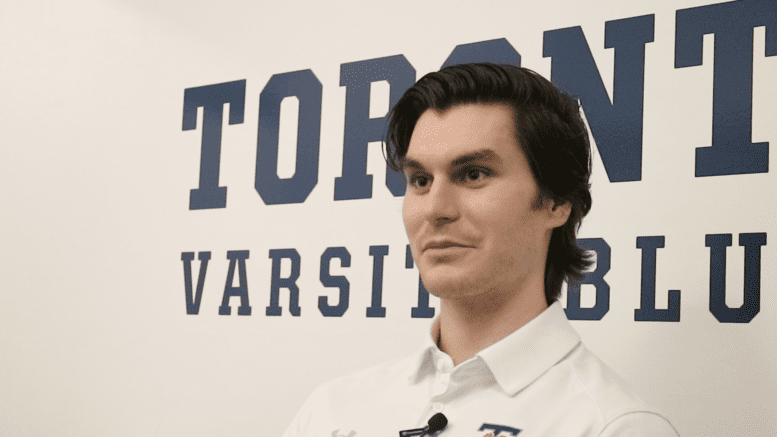Some days, Colin Paradis seems more like a juggler than a university hockey player. In between games and practices, he’s often holed up in a University of Toronto library studying for tests and exams for his program. When he’s not studying or hitting the ice, he’s travelling his practices, games and classes by bike.
It’s a hustle that’s hard on his mind and his body. That’s where his program of study comes in. Like many other student athletes, Paradis is studying kinesiology, which allows him to better understand his own anatomy and enhance his athletic performance. It also puts him on the path for a sports-related career after graduation.
Studying kinesiology prepared the University of Toronto Varsity Blues men’s hockey player for “being able to come back from pretty significant injuries”, including a significant acromioclavicular (AC) joint sprain in his right shoulder.
Chiropractors in Paradis’ hometown of Sherwood Park, Alta., suggested a degree in “kin” would be a solid foundation on the way to becoming a chiropractor himself.
“I always have been interested in performance … I think it’s pretty incredible seeing what elite athletes can do,” said Paradis, who is turning 25 in April.
Watch Colin Paradis explain why he is studying kinesiology:
Kinesiology’s popularity among student athletes
Kinesiology provides students with opportunities to pursue careers in coaching or teaching. And as Paradis has learned, it also allows them to work in allied health fields, which include nursing, physiotherapy and medical school.
This field of study helped Canadian olympic trampolinist Rosie MacLennan transition to working as an advisor for different companies such as Right to Play, an organization dedicated to helping children “rise above adversity” through playing sports, dance, and art.
MacLennan, a U of T graduate in the kinesiology program, won gold medals at the 2012 and 2016 Summer Olympics. She retired from competition in December 2022 and is associated with many groups on Canada’s Olympic committee.
One opportunity that comes from kinesiology is learning physiology, specifically through training and exercise. Paradis said he enjoyed learning that as he understood the difference from an athletic to rehabilitation standpoint.
Learning how question health care providers
He’s also learned by asking therapists questions regarding their methods. He said by doing that, he wanted to “gain a deeper understanding, or seeing if I even had the right answer myself just in my head.”
Paradis understands that the knowledge he has gained from studying kinesiology will help him in recovery as he gets older. That comprehension also came from earning a summer research opportunity alongside a U of T Prof. Tim Welsh.
Welsh, a professor in the kinesiology program, said Paradis earned that chance by winning the University of Toronto Excellence Award, giving him the opportunity to get hands-on experience with dyad learning, “where two people are learning how to perform a certain movement together,” the professor explained.
“(The) University of Toronto Excellence Award is quite a prestigious award and it provides an opportunity for a variety of individuals to get experience in the research realm,” said Welsh.
Accountability in the classroom
As athletes compete, they also hold a responsibility to their schoolwork. Paradis’ Varsity Blues assistant coach Andrew Dovey said there are updates from professors on a regular basis regarding an athlete’s academic performance.
“[Players] have an idea of how to manage a workload, how to manage their time, and know what they need to do to be successful before getting into the school,” he said about the men’s players.
Read more from the Toronto Observer:
- Canadian student athletes move to the U.S. due to lack of professional opportunities
- Academics before athletics for USF’s Bryant
- Unexpected setback helped golden Rosie MacLennan regain fire
There are many outlets to pursue when studying kinesiology that will also help athletes stay connected to sports. The knowledge that’s accumulated can be taught to future generations of athletes to better comprehend the human body and enhance performance in athletics.
As Paradis leaves each building he’s entered to study or play hockey, he is left certain that his university days have paved a path forward in his desire of being a chiropractor.

